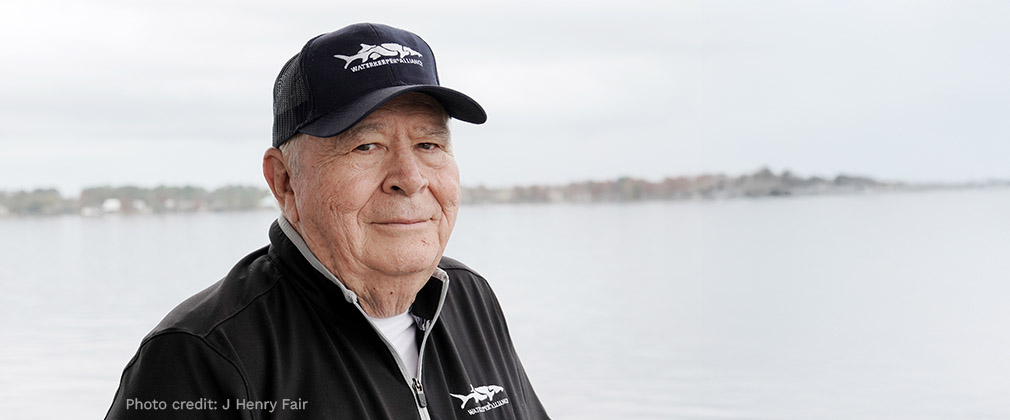Saluting Rick Dove, 1939–2025
The Johns Hopkins Center for a Livable Future (CLF) is saddened by news of the death of our friend and ally, Rick Dove, who died on August 22, 2025, from the effects of a stroke.
Rick Dove, who made his home for several decades on the shores of the Neuse River near New Bern, North Carolina, is known and beloved in the environmental justice community. He was the first Neuse Riverkeeper (1993–2000) and helped to found the Waterkeeper Alliance. He continued as the southeastern representative of the Waterkeeper Alliance from 2000 to 2005.
His life and career took many interesting forks in the road, from practicing law, to being drafted for the Vietnam War and serving as a US Marine for more than 25 years, to working as a fisherman. “I joined the Marine Corps because the draft was chasing me. As it turned out, I liked it a lot, so I stayed for 25 years,” he reflected.
As a lawyer and riverkeeper, Dove did everything he could to stop and prevent pollution of the Neuse River by suing wastewater treatment plants and hog farms. His efforts also contributed to the creation of state rules to reduce pollution, which were put in place for the Neuse River Basin in 1997.
In more recent years, he’s aided activists by taking people on helicopter and small airplane tours to document sources of pollution. In 1999, during Hurricane Matthew, Dove helped people see from the skies how local water supplies were polluted by the overflow of massive waste lagoons filled with animal waste. In 2018, Hurricane Floyd hit the region even harder, flooding hog farms, and Dove took people on flights over the landscape of eastern North Carolina, which was devastated by swine and poultry waste and dead animals that were flowing in the rivers.
In 2022, CLF’s communications associate Mike Milli and senior research associate Tom Philpott traveled to Duplin Country, North Carolina, and were escorted by Dove and another riverkeeper, Larry Baldwin, on a tour of industrial hog farms. They were supposed to take a tour via Cessna, but the weather would not allow them to fly. Dove whispered to Milli, “If this was the 90s, we would be up there.”
“What an incredible man and incredible life,” says Philpott. “He has a huge brain and knowledge of the landscape, an absolute legend. He had so much esteem in the communities, and people loved him. As a journalist, if Rick introduces you to someone, you’re vouched for.”
In the early 2000s, Dove was instrumental in helping to generate public statements on the problems with the swine industry in North Carolina. These public comments were especially helpful in the Pew Commission on Industrial Farm Animal Production, an independent commission established by The Pew Charitable Trusts and the Johns Hopkins Bloomberg School of Public Health. He was among a group that included Larry Baldwin, Steve Wing, Devon Hall, Naeema Muhammed, Elsie Herring and Gary Grant.
Bob Martin, a senior adviser to CLF, remarks that Dove helped the Pew commissioners to approach food system issues from an intellectual standpoint.
“Rick was deeply committed to ending the pollution from industrial operations that were killing the Neuse River in North Carolina and damaging the health of residents. He brought the same dedication of his legal training and 25 years of service in the Marine Corps to fighting the source of the Neuse River pollution,” says Martin. “Rick Dove was one of the great ones and will be missed.”
He will be missed by all who worked with him, especially those at the Center.
